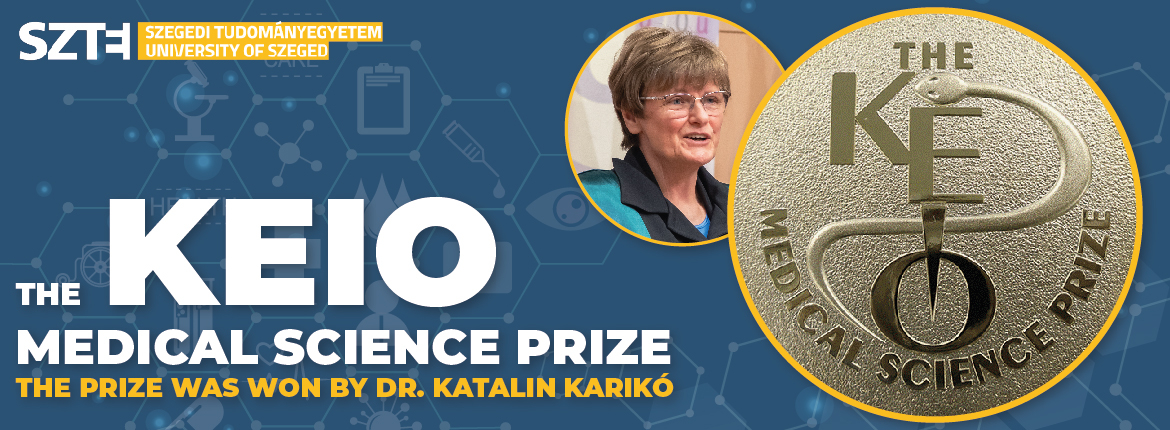

Katalin Karikó to Receive the Keio Medical Science Prize from a Prestigious Japanese University
The Keio Medical Science Prize has been awarded to Katalin Karikó "for the discovery of Specific RNA Modification Leading to mRNA Vaccine Development", as announced on 15 September 2021, Japan time. The researcher, who holds a PhD in biochemistry from the University of Szeged, will receive a certificate of merit, medal, and a monetary award of 10 million yen for her work.
The nominees of the Keio Medical Science Prize are selected by around ninety Japanese academics, after collecting nominations from around the world. Of the 47 laureates in the history of the Keio Prize, 8 went on to win Nobel Prizes.
The Keio Medical Science Prize gives recognition to the outstanding and creative achievements of researchers in the fields of medicine and the life sciences, in particular those contributing to scientific developments in medicine. In 2021, the international award will be given to Katalin Karikó (University of Pennsylvania) for her "discovery of Specific RNA Modification Leading to mRNA Vaccine Development". The other laureate is Osamu Nureki (University of Tokyo), whose subject is "Structural Biology of Key Molecules in Life".
The motto of Keio University is: "The pen is mightier than the sword". The Tokyo-based institution is ranked 201st in this year's QS World University Rankings, the first among private universities in Japan. The Keio International Medical Science Prize was established in 1995 to raise the university's profile. The two laureates will receive a 10-million-yen monetary award each in 2021.
The expansion of researcher networks throughout the world is one of the objectives of the Keio Medical Science Prize. Katalin Karikó is absolutely worthy of the award in this respect too, as she has repeatedly said that she still uses the contacts she made as a student at the University of Szeged to find solutions to problems she encounters during her research.
As the founder of the International mRNA Health Conference, she organizes exchange events for people working in the field, including a trip to Japan in 2013. Katalin Karikó's supportive attention also extends to Japanese researchers working in her field. At the University of Pennsylvania, she worked with Hiromi Muramatsu, who also supported her work at a biotechnology company in Germany, and they launched BioNTech's 'nucleoside-modified mRNA programme' together. Another result of this relationship was an educational film on Japanese television in which Hiromi Muramatsu and Nobel Prize winner Shinya Yamanaka explained the role of Katalin Karikó's discovery in the development of the COVID-19 vaccine.
Katalin Karikó first heard about the medical applications of mRNA at her alma mater, the University of Szeged and the Szeged Biological Research Centre. She started working on mRNA in 1989 in the United States, with the conviction that mRNA could be used to instruct cells to make their own medicines. However, as it turned out, synthesised mRNA released into the body caused severe inflammation, but Katalin Karikó discovered that the incorporation of a modified nucleoside, known as pseudouridine, into the mRNA ablated the immune response, and more protein is produced from the mRNA than ever before. This research by Katalin Karikó has enabled the development of COVID-19 vaccines. Now that mRNA vaccine technology has been proven, it is expected to transform other vaccines and therapeutic strategies to tackle not only infectious diseases but also cancer and heart failure.
For more information about Dr. Katalin Karikó, Honorary Doctor and Alumnus of the University of Szeged, please visit the SZTE news portal or the website of the SZTE Klebelsberg Library.
Previous articles are also available here:
- Katalin Karikó and her Research Partner Awarded the "Scientific Oscar" Award
- Katalin Karikó Received the Reichstein Medal: "Entering the Spacious Hallway of the Nobel Prize."
-
Katalin Karikó, SZTE Alumna Receives Honorary Doctoral Degree from the University of Szeged
- Katalin Karikó, an Alumna of the University of Szeged, is the Founder of the Most Promising Vaccine Development against the Coronavirus





